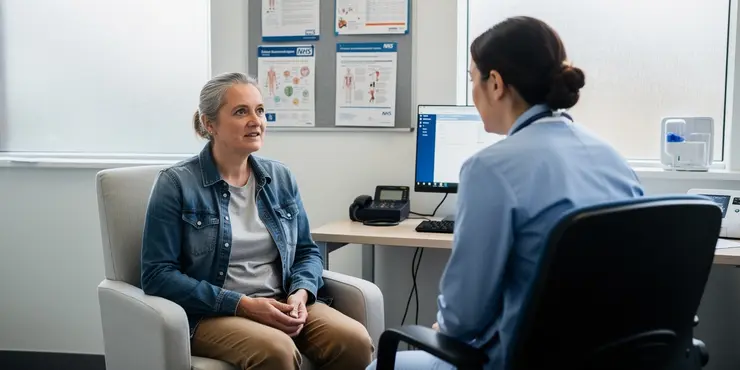
Find Help
More Items From Ergsy search
-

Is chronic fatigue syndrome contagious?
Relevance: 100%
-
What is chronic fatigue syndrome?
Relevance: 96%
-

What causes chronic fatigue syndrome?
Relevance: 96%
-

Are there psychological aspects to chronic fatigue syndrome?
Relevance: 92%
-
Is chronic fatigue syndrome a mental illness?
Relevance: 90%
-

Who is at risk of developing chronic fatigue syndrome?
Relevance: 85%
-
Can children develop chronic fatigue syndrome?
Relevance: 85%
-

What role do infections play in chronic fatigue syndrome?
Relevance: 83%
-

How is chronic fatigue syndrome treated?
Relevance: 78%
-

Is there a cure for chronic fatigue syndrome?
Relevance: 77%
-

Myalgic encephalomyelitis or chronic fatigue syndrome (ME/CFS) | NHS
Relevance: 72%
-

How is chronic fatigue syndrome diagnosed?
Relevance: 72%
-

Can chronic fatigue syndrome be managed with lifestyle changes?
Relevance: 63%
-

How does CFS differ from regular fatigue?
Relevance: 46%
-

What is Cushing's syndrome?
Relevance: 39%
-

What is irritable bowel syndrome (IBS)?
Relevance: 37%
-

Prader-Willi Syndrome | NHS
Relevance: 35%
-

Can fatigue result in dangerous driving?
Relevance: 34%
-

Carpal Tunnel Syndrome
Relevance: 34%
-

Munchausen's syndrome | NHS
Relevance: 34%
-

Symptoms of irritable bowel syndrome (IBS)
Relevance: 33%
-

What causes Carpal Tunnel Syndrome?
Relevance: 33%
-
Can weight loss medications cause fatigue?
Relevance: 32%
-

About irritable bowel syndrome (IBS)
Relevance: 32%
-

What is Carpal Tunnel Syndrome (CTS)?
Relevance: 32%
-

Having a child with Down's syndrome | NHS
Relevance: 32%
-

Down's syndrome: Emily's story | NHS
Relevance: 32%
-

What is post-treatment Lyme disease syndrome (PTLDS)?
Relevance: 32%
-

Charles Bonnet Syndrome
Relevance: 31%
-

What is congenital rubella syndrome?
Relevance: 31%
-

Managing Chronic Illness Within the Family
Relevance: 31%
-

Is Carpal Tunnel Syndrome covered by the NHS?
Relevance: 31%
-

Turner syndrome: Beyond the classic XO phenotype
Relevance: 31%
-

Exercises for sciatica: piriformis syndrome | NHS
Relevance: 31%
-

Can CFS be prevented?
Relevance: 31%
-

How is Carpal Tunnel Syndrome diagnosed?
Relevance: 31%
-

Are there any alternative treatments for Carpal Tunnel Syndrome?
Relevance: 31%
-

What is complex sleep apnea syndrome?
Relevance: 31%
-

What is complex sleep apnea syndrome?
Relevance: 31%
-

How does post-exertional malaise relate to CFS?
Relevance: 30%
Understanding Chronic Fatigue Syndrome
Chronic Fatigue Syndrome (CFS), also known as myalgic encephalomyelitis (ME), is a complex disorder characterized by extreme fatigue that cannot be explained by any underlying medical condition. The fatigue worsens with physical or mental activity but does not improve with rest. Understanding the causes of CFS is essential for managing this debilitating condition.
Possible Causes and Contributing Factors
The precise cause of CFS remains unknown, but researchers believe it may be triggered by a combination of factors. These factors could include viral infections, immune system problems, hormonal imbalances, or mental health issues. It is likely that CFS results from a combination of these elements rather than a single cause.
Viral Infections
Some people develop CFS after having a viral infection. Specific viruses, such as Epstein-Barr virus, human herpesvirus 6, and the Ross River virus have been studied to determine their potential connection to CFS. However, no conclusive link has been established. It's thought these infections might trigger CFS due to their influence on the immune system.
Immune System Dysfunction
Many individuals with CFS appear to have impaired immune systems, though it is unclear if this is a cause or an effect of the disorder. Researchers have observed that people with CFS often have mild immunological abnormalities, suggesting that a compromised immune response could play a role in the development of the syndrome.
Hormonal Imbalances
Hormonal imbalances, particularly involving the hypothalamic-pituitary-adrenal axis, have been linked to CFS. This system controls reactions to stress and regulates various body processes, including digestion, the immune system, mood and emotions, and energy storage and expenditure. Irregularities in these hormones could contribute to fatigue and other symptoms associated with CFS.
Genetic Predisposition
Evidence suggests that genetic factors might play a role in CFS. It’s not uncommon for the condition to occur more frequently among family members, indicating a potential genetic link. Studying the genetic profiles of affected individuals could offer insights into who might be at increased risk of developing CFS and why.
Mental Health Factors
Stress and emotional trauma have been suggested as potential triggers for CFS. While they are not direct causes, these factors may worsen or trigger symptoms in susceptible individuals. Managing mental health effectively might be crucial for alleviating some of the impacts of CFS.
Conclusion
The exact cause of Chronic Fatigue Syndrome is still a mystery, involving a mix of biological, psychological, and social factors. Research is ongoing to uncover more about this puzzling condition. Understanding that CFS is likely multifaceted helps in tailoring more effective treatment approaches to manage its symptoms and improve the quality of life for those affected.
What is Chronic Fatigue Syndrome?
Chronic Fatigue Syndrome (CFS) is a sickness that makes you feel really tired all the time. It does not get better with rest or sleep. This kind of tiredness is not because of another illness. Learning why CFS happens can help people feel better.
Why Do People Get CFS?
We don't know exactly why people get CFS. But, it might happen because of many different things working together. These things can be viruses, problems with the immune system, changes in hormones, or stress. It's probably not just one thing that causes CFS.
Viruses Can Be a Trigger
Sometimes, people feel CFS after being sick from a virus. Some viruses, like the Epstein-Barr virus, have been looked at to see if they cause CFS. We still don't know for sure. These viruses might make CFS happen because they affect the body's defense system (immune system).
Problems with the Immune System
People with CFS often have a weak immune system. This might be why they have CFS or it could be something that happens after they get sick. Scientists see that people with CFS might have small problems with their immune system, which could help cause CFS.
Changes in Hormones
Hormones are chemicals in our body that do many jobs. They help with stress and other body functions, like mood and energy. Changes in these hormones might make people tired and give them other CFS symptoms.
Family History
Having family members with CFS might mean it runs in families. This could be because of genes, which are like instructions in our bodies. Studying family genes might help find out who could get CFS.
Stress and Feelings
Feeling stressed or having bad experiences might make CFS symptoms worse. They are not direct causes, but they can trigger the tiredness. Taking care of mental health is important and can help reduce CFS symptoms.
Final Thoughts
We are still learning what exactly causes Chronic Fatigue Syndrome. Many things like biology, feelings, and experiences mix together to cause it. Research continues to help understand CFS better. Knowing CFS comes from different things can help find better ways to help people feel better.
Frequently Asked Questions
What is chronic fatigue syndrome?
Chronic fatigue syndrome (CFS), also known as myalgic encephalomyelitis (ME), is a complex disorder characterized by extreme fatigue that cannot be explained by any underlying medical condition.
What causes chronic fatigue syndrome?
The exact cause of chronic fatigue syndrome is unknown, but it is believed to be a combination of genetic, environmental, and biological factors.
Can viral infections cause chronic fatigue syndrome?
Yes, some people report developing chronic fatigue syndrome after viral infections, leading researchers to believe that infection may be a triggering factor for some individuals.
Is there a genetic link to chronic fatigue syndrome?
There is some evidence to suggest a genetic predisposition to chronic fatigue syndrome, as the syndrome appears to sometimes run in families.
Can stress contribute to chronic fatigue syndrome?
Chronic stress may play a role in the development of chronic fatigue syndrome by affecting the immune system and other bodily functions.
Are immune system problems involved in chronic fatigue syndrome?
Some research suggests that immune system dysregulation may contribute to chronic fatigue syndrome, although more studies are needed to confirm this.
Is there a link between chronic fatigue syndrome and hormonal imbalances?
Hormonal imbalances, particularly involving the hypothalamic-pituitary-adrenal (HPA) axis, may be related to chronic fatigue syndrome, although the evidence is not conclusive.
Can physical or emotional trauma trigger chronic fatigue syndrome?
Some individuals report that chronic fatigue syndrome developed after significant physical or emotional trauma, suggesting it might be a potential trigger for some.
How is stress related to chronic fatigue syndrome?
High levels of stress may lead to hormonal and immune changes in the body, which can potentially trigger or exacerbate chronic fatigue syndrome.
Can environmental factors influence chronic fatigue syndrome?
Environmental factors such as toxins or chemicals might contribute to chronic fatigue syndrome, but more research is needed to understand this relationship.
Is chronic fatigue syndrome related to other illnesses or conditions?
Chronic fatigue syndrome can occur alongside other medical conditions, but it's not clear whether they share common causes or risk factors.
Can chronic fatigue syndrome occur in all age groups?
Yes, chronic fatigue syndrome can occur in people of all ages, although it is most commonly diagnosed in individuals between 40 and 60 years old.
Is there a psychological component to chronic fatigue syndrome?
While chronic fatigue syndrome is not considered a psychiatric disorder, mental health conditions such as depression or anxiety can coexist with CFS, making diagnosis and treatment more complex.
Can sleep disorders be mistaken for chronic fatigue syndrome?
Yes, sleep disorders can cause fatigue and may initially be mistaken for chronic fatigue syndrome if other symptoms align.
Are there specific tests to diagnose chronic fatigue syndrome?
There are no specific tests for chronic fatigue syndrome. Diagnosis is made based on ruling out other conditions and identifying a specific set of symptoms.
Can chronic fatigue syndrome be cured?
Currently, there is no cure for chronic fatigue syndrome, but symptoms can be managed through lifestyle changes, medication, and other therapies.
How does chronic fatigue syndrome affect daily life?
Chronic fatigue syndrome can significantly impact daily life by reducing energy levels and limiting the ability to carry out normal activities and responsibilities.
Can diet and nutrition affect chronic fatigue syndrome?
Diet and nutrition might affect symptom management in chronic fatigue syndrome. Eating a balanced diet can help manage energy levels and support overall health.
Are there any risk factors for developing chronic fatigue syndrome?
Potential risk factors for chronic fatigue syndrome include age, gender (being female), and genetic predisposition, among others.
What treatments are available for chronic fatigue syndrome?
Treatment for chronic fatigue syndrome often involves a combination of medication, cognitive therapy, physical therapy, and lifestyle changes to manage symptoms.
What is chronic fatigue syndrome?
Chronic fatigue syndrome (CFS) is a health problem that makes you feel very tired all the time. This tiredness does not go away, even if you rest or sleep. People with CFS might have other symptoms like sore muscles, trouble concentrating, or feeling dizzy.
If you want to learn more or need help, you can try:
- Talking to a doctor or nurse.
- Reading books with pictures and simple words.
- Using videos to help understand.
Chronic fatigue syndrome, or CFS, is also called ME. It is a hard-to-understand illness. People with CFS feel very tired all the time. This tiredness is not caused by anything else.
Why do people have chronic fatigue syndrome?
Chronic fatigue syndrome is when you feel very tired for a long time. Doctors don't know exactly why it happens.
Here are some ideas they have:
- Infections: Sometimes, getting sick with a virus might make you tired.
- Weak immune system: Your body's defense might not be strong enough.
- Stress: Feeling worried or stressed for a long time can make you tired.
- Sleep problems: Not getting enough good sleep can make you feel worn out.
If you feel very tired a lot, talk to a doctor. They can help you find out what might be wrong.
Here are some tools to help:
- Take rest breaks during the day.
- Make a simple schedule to manage your energy.
- Write down or draw how you're feeling.
We do not know exactly what causes chronic fatigue syndrome. But, it may be caused by things like genes, the environment, and the body’s health.
Can a virus make you feel tired all the time?
Some people think that a virus can make you feel very tired and sick for a long time. This is called chronic fatigue syndrome.
If you feel very tired for many months, it might be good to talk to a doctor. They can help you find out what's wrong and how to feel better.
Using a diary to track how you feel each day can help. Write down when you feel very tired or have other symptoms. Share this with your doctor.
Yes, some people feel very tired all the time after they get a virus. This makes scientists think that getting sick with a virus might cause tiredness for some people.
Can chronic fatigue syndrome run in families?
Sometimes, illnesses can be passed down from parents to children. This is because of genes.
Chronic fatigue syndrome (CFS) is a condition that makes people feel very tired for a long time.
It is not clear if CFS is caused by genes. Scientists are still studying if it can run in families.
If you or someone you know has CFS, it can help to talk to a doctor.
Using pictures, simple words, and talking to others can make it easier to understand.
Some studies say that being tired all the time might be something you can inherit from your family.
Does stress make people tired all the time?
Feeling stressed for a long time can make you very tired and weak. It can change how your body fights germs and how it works.
Do problems with the body's defense system cause ongoing tiredness?
Some people have body defense systems that do not work as they should. This might make them feel very tired for a long time.
Using pictures or videos can help understand this better. Talking with a doctor or nurse can also help.
Some studies say that problems with the immune system might cause chronic fatigue syndrome. But we need more studies to be sure.
Do hormones make people with chronic fatigue syndrome tired?
Sometimes, our body's hormones can be out of balance. This can happen with something called the HPA axis, which is part of how our body handles stress.
When this happens, it might be linked to feeling tired all the time, which is called chronic fatigue syndrome. But we are not completely sure yet.
If you find reading hard, you can use tools that read text out loud or highlight words as you read. Taking breaks and reading with someone else can also help.
Can getting hurt or feeling very sad make you very tired all the time?
Some people say they got really tired all the time after getting hurt or really upset. This could be a reason why it started for them.
How does stress affect tiredness that doesn't go away?
Stress can make you feel very tired all the time. This is called chronic fatigue syndrome.
If you feel stressed, your body and mind get tired quicker. It's like being in overdrive all the time.
Here are some things that might help:
- Take deep breaths to help relax.
- Get a good night's sleep.
- Talk to someone you trust about how you feel.
- Do something fun that makes you happy.
Remember, it is important to take care of yourself and rest when you need to.
When you feel a lot of stress, it can change the ways your body works, like your hormones and how you fight off sickness. This could make you feel very tired all the time, which is called chronic fatigue syndrome.
Some things that might help are:
- Taking deep breaths to relax.
- Talking to someone you trust about how you feel.
- Doing something you enjoy to take your mind off stress.
- Getting help from a doctor or healthcare worker.
Can things around us make chronic fatigue syndrome worse?
Things in the environment, like bad chemicals or toxins, might make people feel very tired all the time. Scientists need to do more research to understand this better.
Is Chronic Fatigue Syndrome Related to Other Illnesses?
Can chronic fatigue syndrome (CFS) be connected to other sicknesses?
Here’s a simpler way to understand it:
- Chronic Fatigue Syndrome is a health problem where you feel very tired all the time.
- Sometimes, other illnesses can happen at the same time as CFS.
- These other illnesses might make you feel even more tired.
If you want help understanding, try:
- Using pictures or drawings to explain ideas.
- Talking with someone who can help make things clearer.
- Using simple words and short sentences.
Chronic fatigue syndrome means feeling really tired all the time. It can happen with other illnesses, but we don't know if they have the same reasons or risks.
Can people of all ages have chronic fatigue syndrome?
Chronic fatigue syndrome (CFS) is a condition that makes you feel very tired.
Anyone can get CFS, from young children to older people.
If you have trouble reading, ask someone you trust to help you. You can also try using audiobooks or reading apps.
Yes, people can have chronic fatigue syndrome at any age. But it happens most often in people who are 40 to 60 years old.
Can feeling tired all the time be affected by how we think and feel?
Sometimes, feeling tired a lot can be linked to our thoughts and feelings. It's important to talk to a doctor. They can help us understand why we feel this way.
- Tell someone how you feel.
- Use a diary to write about your tiredness and feelings.
- Try to keep a routine, like going to bed at the same time every night.
Chronic fatigue syndrome, or CFS, is not a mental illness, but sometimes people with CFS can also have problems like feeling very sad or worried. This can make it harder for doctors to understand what is wrong and how to help.
Can problems with sleep be confused with always feeling very tired?
Yes, problems with sleep can make you very tired. At first, people might think it's a problem called chronic fatigue syndrome. This is possible if you also have other signs that match.
How do doctors know if someone has chronic fatigue syndrome?
Doctors do not have one special test to find out if you have chronic fatigue syndrome.
They look at different things to find out why you feel tired all the time.
Support tools like picture charts can help you talk to your doctor about your tiredness.
There aren't any special tests to find out if someone has chronic fatigue syndrome. Doctors figure it out by checking that it's not something else and looking for certain signs.
Can you get better from chronic fatigue syndrome?
Chronic fatigue syndrome, also known as CFS, makes you feel very tired all the time. It can be hard to find a quick way to feel better. But, doctors and experts can help.
Here are some things that might help:
- Talking to a doctor who understands CFS.
- Getting plenty of rest and sleep.
- Doing gentle exercises, like walking.
- Eating healthy meals.
- Talking to a therapist to help with feelings.
These things may not make CFS go away, but they can help you feel a bit better. It's important to talk to people who can support you, like family, friends, and doctors.
Right now, there is no way to make chronic fatigue syndrome go away completely. But, you can feel better by changing how you live, taking medicine, and trying different kinds of help.
What is life like with long-lasting tiredness?
Long-lasting tiredness is when you feel very tired all the time.
This can make everyday things hard.
People might find it tough to work, play, or even think clearly.
Rest and help from friends or doctors can make things better.
Chronic fatigue syndrome can make life really hard. It makes people feel very tired and makes it tough to do normal things every day.
Can food help with long-term tiredness?
Long-term tiredness is when you feel very tired for a long time. Food can help make your body strong. Eating good food might help with feeling less tired.
Here are some tips:
- Eat fruits and vegetables. They have vitamins that help your body.
- Drink lots of water. Water helps keep your body healthy.
- Avoid too much sugar and junk food. They can make you tired.
If you find reading hard, you can:
- Use pictures to help understand.
- Listen to audiobooks about food and health.
- Ask a friend or family member to read with you.
What you eat can help with tiredness problems. Eating healthy food can give you more energy and help you feel better.
What can make someone get very tired all the time?
Some things might make you more likely to get chronic fatigue syndrome. These can be:
- How old you are
- If you are a girl
- If it runs in your family
These are just a few possible reasons.
What can help if you are always really tired?
If you feel tired all the time, doctors can help you in different ways. They might give you medicine, talk to you to help your thoughts, help you move your body more, or suggest changes to your daily life. These can help you feel better.
Useful Links
This website offers general information and is not a substitute for professional advice.
Always seek guidance from qualified professionals.
If you have any medical concerns or need urgent help, contact a healthcare professional or emergency services immediately.
Some of this content was generated with AI assistance. We’ve done our best to keep it accurate, helpful, and human-friendly.
- Ergsy carfully checks the information in the videos we provide here.
- Videos shown by Youtube after a video has completed, have NOT been reviewed by ERGSY.
- To view, click the arrow in centre of video.
- Most of the videos you find here will have subtitles and/or closed captions available.
- You may need to turn these on, and choose your preferred language.
- Go to the video you'd like to watch.
- If closed captions (CC) are available, settings will be visible on the bottom right of the video player.
- To turn on Captions, click settings .
- To turn off Captions, click settings again.
More Items From Ergsy search
-

Is chronic fatigue syndrome contagious?
Relevance: 100%
-
What is chronic fatigue syndrome?
Relevance: 96%
-

What causes chronic fatigue syndrome?
Relevance: 96%
-

Are there psychological aspects to chronic fatigue syndrome?
Relevance: 92%
-
Is chronic fatigue syndrome a mental illness?
Relevance: 90%
-

Who is at risk of developing chronic fatigue syndrome?
Relevance: 85%
-
Can children develop chronic fatigue syndrome?
Relevance: 85%
-

What role do infections play in chronic fatigue syndrome?
Relevance: 83%
-

How is chronic fatigue syndrome treated?
Relevance: 78%
-

Is there a cure for chronic fatigue syndrome?
Relevance: 77%
-

Myalgic encephalomyelitis or chronic fatigue syndrome (ME/CFS) | NHS
Relevance: 72%
-

How is chronic fatigue syndrome diagnosed?
Relevance: 72%
-

Can chronic fatigue syndrome be managed with lifestyle changes?
Relevance: 63%
-

How does CFS differ from regular fatigue?
Relevance: 46%
-

What is Cushing's syndrome?
Relevance: 39%
-

What is irritable bowel syndrome (IBS)?
Relevance: 37%
-

Prader-Willi Syndrome | NHS
Relevance: 35%
-

Can fatigue result in dangerous driving?
Relevance: 34%
-

Carpal Tunnel Syndrome
Relevance: 34%
-

Munchausen's syndrome | NHS
Relevance: 34%
-

Symptoms of irritable bowel syndrome (IBS)
Relevance: 33%
-

What causes Carpal Tunnel Syndrome?
Relevance: 33%
-
Can weight loss medications cause fatigue?
Relevance: 32%
-

About irritable bowel syndrome (IBS)
Relevance: 32%
-

What is Carpal Tunnel Syndrome (CTS)?
Relevance: 32%
-

Having a child with Down's syndrome | NHS
Relevance: 32%
-

Down's syndrome: Emily's story | NHS
Relevance: 32%
-

What is post-treatment Lyme disease syndrome (PTLDS)?
Relevance: 32%
-

Charles Bonnet Syndrome
Relevance: 31%
-

What is congenital rubella syndrome?
Relevance: 31%
-

Managing Chronic Illness Within the Family
Relevance: 31%
-

Is Carpal Tunnel Syndrome covered by the NHS?
Relevance: 31%
-

Turner syndrome: Beyond the classic XO phenotype
Relevance: 31%
-

Exercises for sciatica: piriformis syndrome | NHS
Relevance: 31%
-

Can CFS be prevented?
Relevance: 31%
-

How is Carpal Tunnel Syndrome diagnosed?
Relevance: 31%
-

Are there any alternative treatments for Carpal Tunnel Syndrome?
Relevance: 31%
-

What is complex sleep apnea syndrome?
Relevance: 31%
-

What is complex sleep apnea syndrome?
Relevance: 31%
-

How does post-exertional malaise relate to CFS?
Relevance: 30%


